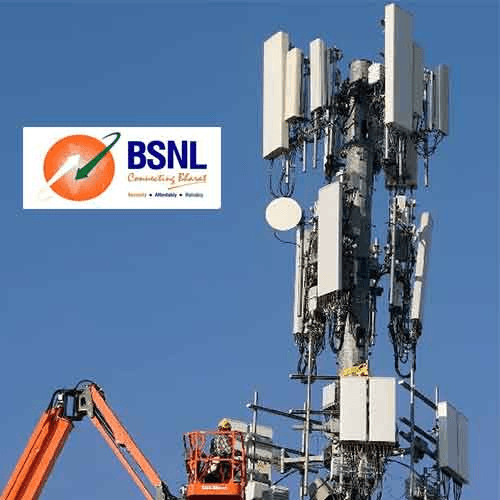BSNL to Launch eSIM Service After 4G Rollout: Calls Without SIM, Internet Without Hassle
'BSNL' is preparing to launch its eSIM service in India right after its 4G rollout. Learn how BSNL eSIM will enable calls without a physical SIM card and offer a smoother internet experience across smartphones and smart devices.
BSNL to Launch eSIM Service After 4G: Calls Without SIM, Internet Without Hassle
India’s telecom sector is witnessing rapid transformation, and Bharat Sanchar Nigam Limited (BSNL) is fast catching up with private players.
BSNL to Launch eSIM Service After 4G Rollout
After the rollout of BSNL 4G across several cities, the state-run telecom operator is gearing up to introduce an advanced feature — BSNL eSIM service. This move will allow users to make calls and use the internet without the need for a physical SIM card, pushing BSNL into the next generation of digital connectivity.
What is eSIM and How It Works
An eSIM (embedded SIM) is a digital SIM technology that eliminates the need for a physical SIM card. Instead of inserting a small plastic chip into your phone, an eSIM is built directly into the device’s hardware.
It can be activated through a QR code or configuration profile provided by the telecom operator.
Once set up, users can switch between networks easily, manage multiple numbers, and enjoy seamless connectivity without physically swapping SIM cards — ideal for smartphones, smartwatches, and IoT devices.
BSNL’s 4G Milestone and Transition to eSIM
BSNL’s ongoing 4G rollout across rural and urban India marked a significant step in the company’s revival plan. Backed by indigenous technology and the support of the Indian government, BSNL aims to strengthen its infrastructure before expanding to 5G and eSIM services.
The introduction of eSIM support aligns with BSNL’s modernization roadmap. It aims to improve user experience, reduce logistic costs for SIM production, and position BSNL alongside market leaders like Jio, Airtel, and Vi — all of whom already offer eSIM functionality.
Benefits of BSNL eSIM for Consumers
The upcoming BSNL eSIM service promises several benefits:
No Physical SIM Needed: Users can activate mobile services through a QR code directly from BSNL’s app or website.
Multiple Profiles: One device can easily manage different BSNL numbers or switch between home and work profiles.
Instant Activation: eSIM setup is faster and eliminates the need to visit a store for SIM issuance.
Better Security: Since eSIMs can’t be physically removed, they provide added security against SIM theft or cloning.
Enhanced Compatibility: eSIM-enabled devices like iPhones, Samsung Galaxy models, and smartwatches will easily integrate with BSNL’s network.
BSNL’s Digital Strategy and 5G Outlook
BSNL’s adoption of eSIM isn’t just a technological upgrade — it’s a clear signal of the company’s digital-first strategy. As India heads toward full 5G coverage, BSNL’s move ensures it doesn’t lag in innovation.
After 4G stabilization, BSNL is expected to conduct controlled rollouts of 5G trials, integrating eSIM support into its 5G-ready network. This will open opportunities for connected IoT ecosystems — from smart homes to vehicles — making BSNL an active participant in India’s digital transformation journey.
Devices Supporting BSNL eSIM
BSNL’s eSIM will cater to a growing list of eSIM-enabled devices, including:
Apple’s iPhone XR, XS, and later models
Samsung Galaxy S20 series and above
Google Pixel phones
Wearables like Apple Watch Cellular and Samsung Galaxy Watch LTE
This compatibility ensures BSNL customers can enjoy eSIM services on both premium and future-ready mid-range devices as the rollout expands.
How to Activate BSNL eSIM
Once the service is launched, activation is expected to be simple and fully digital:
Visit BSNL’s official self-care portal or install the BSNL mobile app.
Log in using your mobile number or registered account.
Choose the eSIM option and generate a QR code for activation.
Scan the QR code on your device under “Mobile Data Settings → Add Cellular Plan.”
Follow on-screen prompts to complete activation.
BSNL might also introduce in-store eSIM activation support for users without smartphones or advanced devices.
Impact on India’s Telecom Landscape
The entry of BSNL into the eSIM segment will bring healthy competition, potentially driving lower eSIM activation costs and better network coverage. Given BSNL’s reach in rural and underserved areas, the eSIM launch could substantially boost digital inclusion in regions where physical SIM distribution faces logistical challenges.
Moreover, travelers and frequent SIM switchers will find eSIM particularly convenient.
It simplifies operator changes, allows global connectivity, and supports multi-operator flexibility — all without traditional SIM-related delays.
Challenges and Future Scope
While BSNL’s eSIM initiative marks progress, certain challenges remain. Network stability during the nationwide 4G upgrade, eSIM backend infrastructure integration, and cross-device configuration consistency are key areas the company must address. However, the benefits far outweigh these transitional hurdles.
In the near future, users can expect BSNL’s eSIM to extend to smart IoT applications such as connected cars, smart meters, and industrial automation — strengthening the “Digital India” vision and expanding the Internet of Things ecosystem.
Conclusion
BSNL’s incoming eSIM service after 4G is a major step toward achieving seamless, SIM-free communication for millions of users.
With enhanced convenience, strong security, and compatibility across new-generation devices, BSNL is poised to modernize India’s telecom infrastructure.
The upcoming months will mark a pivotal shift as the public telecom giant transitions from physical SIMs to fully digital connectivity — making calls and the internet truly hassle-free.
